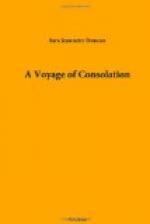This poppa reluctantly admitted with the usual reference to the Irish vote. We both hoped sincerely that any English friends who saw that speech, and paused to realise that the orator was a parent of mine, would consider the number of Irish resident in Illinois, and the amount of invective which their feelings require. Poppa doesn’t really know sometimes whether he is himself or a shillelagh, but whatever his temporary political capacity he is never ungrateful. He went on to give me the particulars of his interview with the President about the Chicago Post Office, and then I gradually unfolded my intention of preparing our foreign experiences as a family for publication in book form. While I was unfolding it poppa eyed me askance.
“Is that usual?” he inquired.
“Very usual indeed,” I replied.
“I mean—under the circumstances?”
“Under what circumstances?” I demanded boldly. I knew that nothing would induce him to specify them.
“Oh, I only meant—it wasn’t exactly my idea.”
“What was your idea—exactly?” It was mean of me to put poppa to the blush, but I had to define the situation.
“Oh,” said he, with unlooked-for heroism, “I was basing my calculations with reference to you on the distractions of change—Paris dry-goods, rowing round Venice in gondolas, riding through the St. Gothard tunnel, and the healing hand of time. I don’t intend to give a day less than six weeks to it. I’m looking forward to the tranquilising effect of the antique some myself,” he added, hedging. “I find these new self-risers that we’ve undertaken to carry almost more than my temperament can stand. They went up from an output of five hundred dollars to six hundred and fifty thousand, and back again inside seven days last month. I’m looking forward to examining something that hasn’t moved for a couple of thousand years with considerable pleasure.”
“Poppa,” said I, ignoring the self-risers, “if you were as particular about the quality of your fiction as you are about the quality of your table-butter, you would know that the best heroines never have recourse to such measures now. They are simply obsolete. Except for my literary intention, I should be ashamed to go to Europe at all—under the circumstances. But that, you see, brings the situation up to date. I transmit my European impressions through the prism of damaged affection. Nothing could be more modern.”
“I see,” replied poppa, rubbing his chin searchingly, which is his manner of expressing sagacious doubt. His beard descends from the lower part of his chin in the long unfettered American manner, without which it is impossible for Punch to indicate a citizen of the United States. When he positively disapproves he pulls it severely.
“But Europe’s been done before, you know,” he continued. “In fact, I don’t know any continent more popular than Europe with people that want to publish books of travel. It’s been done before.”




